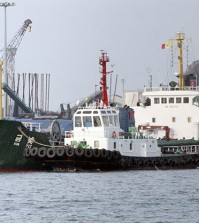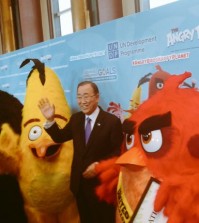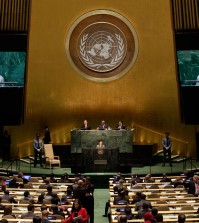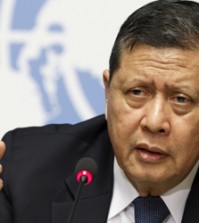- California Assembly OKs highest minimum wage in nation
- S. Korea unveils first graphic cigarette warnings
- US joins with South Korea, Japan in bid to deter North Korea
- LPGA golfer Chun In-gee finally back in action
- S. Korea won’t be top seed in final World Cup qualification round
- US men’s soccer misses 2nd straight Olympics
- US back on track in qualifying with 4-0 win over Guatemala
- High-intensity workout injuries spawn cottage industry
- CDC expands range of Zika mosquitoes into parts of Northeast
- Who knew? ‘The Walking Dead’ is helping families connect
Russia urges coordinated terrorism fight as airstrikes begin

U.S. Secretary of State John Kerry attends the United Nations Security Council, Wednesday, Sept. 30, 2015, at the U.N. headquarters. During the meeting, Kerry delivered remarks encouraging the international community to end the conflict in Syria. (AP Photo/Kevin Hagen)
UNITED NATIONS (AP) — Russia followed its launch of airstrikes in Syria with a call on Wednesday for the world to unite in the fight against terrorist groups, and Foreign Minister Sergey Lavrov told foreign ministers of world powers that his country was circulating a draft U.N. Security Council resolution to help make it happen.
Secretary of State John Kerry responded by announcing that the United States is prepared to welcome Russia actions in Syria if they are directed at the Islamic State group and al-Qaida, and promising that the U.S.-led coalition fighting the Islamic State group in Syria would “dramatically accelerate our efforts.”
And Syrian Foreign Minister Walid al-Moallem told the council that his country strongly endorses Russia’s latest moves and called French and other airstrikes in Syria that aren’t coordinated with his government a “blatant contravention” of international law. Foreign Minister Javad Zarif of Iran, Syria’s closest ally, noted that the U.S.-led coalition was “failing to achieve its goals.”
Russia spoke a day after President Barack Obama made his own pitch on countering the threat of the Islamic State and other groups to a gathering of world leaders at the United Nations.
With Obama gone on Wednesday, it was the turn of Russia, which this month holds the presidency of the Security Council, the U.N.’s most powerful body.
Also Wednesday:
— Palestinian President Mahmoud Abbas declared in a speech to the U.N. General Assembly, to applause, that he is no longer bound by agreements signed with Israel. The Palestinians then celebrated the raising of their flag at U.N. headquarters for the first time as a non-member observer state.
— The so-called Quartet of Mideast mediators — the United Nations, the United States, the European Union and Russia — was meeting alone first and then with key Mideast nations to discuss reviving long-stalled peace negotiations.
— Migration was the subject of a high-level session on the sidelines of the General Assembly’s annual ministerial meeting.
In the Security Council, Lavrov said Russia is ready to “forge standing channels of communication to ensure a maximally effective fight.” He listed countries with a key role to play in resolving the chaos in Syria, including Iran, Russia, Saudi Arabia, Turkey, Egypt, Jordan, Qatar , the U.S. and even China.
“What we require are collective agreed approaches backed by Security Council,” Lavrov said.
Kerry said the U.S. is prepared to hold what he described as “de-confliction” talks with Russia over the two airstrike campaigns “as early as possible,” even this week.
“We will ensure through precision airstrikes that ISIL do not have any sanctuary, anywhere, on the ground in Syria,” Kerry said, using an acronym for the Islamic State group.
The foreign minister of France, which began its own airstrikes in Syria a few days ago, told the council that his country is ready to cooperate with Russia and others in the fight against the Islamic State group in Syria, but under three conditions that include an end to violence against Syria’s civilians and the exit of President Bashar Assad.
Laurent Fabius said the collective way forward must include a “broad-based negotiation toward a political transition that doesn’t lead to maintaining in power Syria’s hangman.”
The French minister said another condition for cooperating with other states is having “absolute clarity” about who the countries are fighting.
Frustrated by years of deep divide in the Security Council on Syria, with Russia and China using their veto power to block several proposals, Fabius called the body a “council of impotence.” France was chairing a meeting Wednesday on its campaign to have the council’s five permanent members restrain their use of the veto in cases of mass atrocities. Russia has rejected that idea.
British Foreign Minister Philip Hammond said his country welcomes Russia’s new “focus” on using force but warned it’s “very important that Russia be able to confirm that military action it has undertaken this morning” doesn’t target Syria’s moderate opposition. He urged Russia to use its influence on Syria to make it stop using barrel bombs and chemicals on civilians.
Other U.S. allies were clearly worried by Russia’s new moves in Syria, with Italian Foreign Minister Paolo Gentiloni telling the council that Russia’s proposal was “a possible step in the right direction” if a political transition were also addressed, but he also told reporters, “There’s no rapid military solution to this enormous humanitarian tragedy.”
___
Associated Press writer Matthew Lee in New York and Greg Keller, Alina Heineke and George Jahn at the United Nations contributed.












![일본 사도광산 [서경덕 교수 제공. 재판매 및 DB 금지]](http://www.koreatimesus.com/wp-content/uploads/2024/07/PYH2024072610800050400_P4-copy-120x134.jpg)


